- Home
- Rosamunde Pilcher
Sleeping Tiger Page 8
Sleeping Tiger Read online
Page 8
“Which is your boat?”
“That one.”
“What’s her name?”
“Eclipse.”
“She looks big to sail single-handed.”
“She is. I usually have a crew.” He added, “I get a bit edgy when this heavy weather blows up. A hell of a sea comes in round that headland, and I’ve known her pull anchor.”
“Surely she’s safe there.”
“The rocks come too far out into deep water for comfort.”
She glanced at the sky. It was overcast and leaden. “Is there going to be another storm?”
“Yes, the wind’s changed. It was a rotten forecast.” He lowered the binoculars and looked down at her. “Did you catch the storm last night?”
“It chased us over the Pyrenees. We could scarcely land at Barcelona.”
He said, “I don’t mind a storm at sea, but a storm in the air scares me paralytic. Are you ready?”
“Yes.”
“We’ll take the car.”
They went back into the house and he put down his binoculars on the desk, and Selina collected her bag and said a silent good-bye to the Casa Barco. She had thought so much about coming to it, and now, after only a few hours, she was leaving it again. For good. She picked up her coat. He said, “What the hell’s that for?”
“It’s my coat. It’s cold in London.”
“You know, I’d forgotten. Here, I’ll carry it for you.” He slung it over his shoulder and added, “One thing about losing all your luggage, you do at least travel light.”
They went out of the house, and Selina didn’t know whether his car was meant as a joke or not. It looked as if it had been decorated for a Students’ Rag Week, and she longed to ask if he had painted the wheels yellow himself, but somehow hadn’t the nerve. They clambered in, and George piled Selina’s coat on her knee, then started the engine, jammed in the gear, and turned the car in a series of hair-raising forward and backward jerks. Disaster loomed. At one moment they seemed about to ram a solid wall. The next, their back wheels teetered at the edge of a steep alley of steps. Selina shut her eyes. When at last they shot forward and up the hill there was an overpowering smell of exhaust, and sinister clanking sounds came from somewhere beneath her feet. The seats sagged and had holes in them, and the floor, which had lost its carpeting years ago, resembled nothing so much as the bottom of a dustbin. For George’s sake, Selina hoped that his yacht was more seaworthy.
But, for all that, there was something very friendly about driving through Cala Fuerte in George Dyer’s car. All the children screamed with laughter and waved, and shouted joyous salutations. All the women sitting in their gardens, or gossiping at their doors, turned to smile and send a greeting after them. All the men, sitting outside the cafés, walking home from work, stopped to let them go bowling by, with shouted pleasantries in Spanish which Selina didn’t understand, but which George Dyer evidently did.
“What are they saying?”
“They want to know where I found my new Señorita.”
“Is that all?”
“Isn’t that enough?”
They came with a flourish up to the Cala Fuerte Hotel, and stopped so suddenly that a cloud of white dust rose from their wheels and coated the tables, and the drinks of the clients who sat on Rudolfo’s terrace enjoying the first aperitifs of the evening. An Englishman was heard to say, “Bloody cheek,” but George Dyer ignored him, climbed out of the car without bothering to open the door, and went up the steps of the terrace and through the chain curtain with Selina behind him.
“Rudolfo!”
Rudolfo was behind the bar. He said, in Spanish, “There is no need to shout.”
“Rudolfo, where is the taxi-driver?”
Rudolfo was not smiling. He poured a tray of drinks and said, “The taxi-driver has gone.”
“Gone? Didn’t he want his money?”
“Yes, he wanted his money. Six hundred pesetas.”
“Who paid him?”
“I did,” said Rudolfo. “And I want to talk to you. Wait till I serve my customers.”
He came out from behind the bar, walked past them without a word, and disappeared through the chain curtain and on to the terrace. Selina stared at George. “Is he angry?”
“At a guess I’d say he was annoyed about something.”
“Where is Toni?”
“He’s gone. Rudolfo paid him off.”
It took a second or so for the enormity of this to sink in. “But if he’s gone … how am I going to get back to San Antonio?”
“God knows.”
“You’ll have to take me.”
“I am not driving back to San Antonio this evening, and even if I did, we still can’t buy you a plane ticket.”
Selina bit her lip. She said, “Rudolfo seemed so nice before.”
“Like all of us he has two sides to his character.”
Rudolfo returned, the chain curtain clashed behind him, and he put down his empty tray and turned on George.
He did it in Spanish which was perhaps just as well, for the language he employed was not for the ears of a delicately-nurtured young English Señorita. George, with spirit, defended himself. As their voices rose, Selina, unable to ignore the obvious fact that a good deal of the references were to herself, would say, “Oh, please tell me what it’s all about,” or “Couldn’t you say some of this in English so that I could understand?” but neither of them took the slightest notice of her.
The argument was interrupted at last by the arrival of a fat German who wanted a glass of beer, and while Rudolfo went behind the bar to serve him, Selina took the opportunity to tug at George’s sleeve and say, “What’s happened? Tell me what’s happened!”
“Rudolfo is annoyed because you said you would wait at the Casa Barco, and he thought that the taxi-driver would wait there with you. He doesn’t like stray taxi-drivers sitting round his bar, getting sloshed, and he seems to have taken a particular dislike to this one.”
“Oh.”
“Yes, oh.”
“Is that all?”
“No, of course it’s not all. In the end, to get rid of the man, Rudolfo paid him. And now he says I owe him six hundred pesetas, and he’s got cold feet because he doesn’t think I’ll be able to pay him back.”
“But, I’ll pay him.… I promise.…”
“That isn’t really the point. He wants it now.”
The fat German, sensing a bad atmosphere, carried his beer outside and he was no sooner away than Rudolfo and George turned on each other once more, but Selina moved swiftly forward.
“Oh please, Mr.… Rudolfo, I mean. It’s all my fault, and I’ll see you get paid back, but you see, all my money was stolen.…”
Rudolfo had heard this before. “You said you would wait at the Casa Barco. With the taxi-driver.”
“I didn’t know he would be here for so long.”
“And you,” Rudolfo turned to George again. “Where were you, anyway? Going off to San Antonio, and not coming back, and nobody knows where you are…”
“What the hell’s it got to do with you? Where I go and what I do is my own bloody business.”
“It has to do with me when I have to pay your bills.”
“Nobody asked you to pay it. And it wasn’t my bill, anyway. And you’ve loused everything up, because now the Señorita can’t get back to San Antonio.”
“Then take her yourself!”
“I’ll be damned if I will!” yelled George. And with that, he stormed out of the bar, was down the terrace steps in a single stride, and into his car. Selina shot after him. “What about me?”
He turned to look at her. “Well, are you coming or are you going to stay here?”
“I don’t want to stay here.”
“Come on, then.”
There was no alternative. Half the village, and all Rudolfo’s customers, seemed to be enjoying the scene. George leaned over to open her door, and Selina got in beside him.
At this mo
ment, as if on a signal from some celestial stage manager, the storm broke.
There was a flash of lightning that split the sky, a roll of thunder and a sudden upsurge of wind that sent the pines shaking. The tablecloths on the Cala Fuerte terrace rose and flapped like badly-set sails, and a hat blew from the rack outside Maria’s shop, and went bowling, a big pink and yellow wheel, down the main street. Dust rose in spirals, and behind the wind came the rain, a sudden sheet of it, the drops so big and heavy that in seconds the gutters were flooded.
Everybody rushed indoors. Rudolfo’s customers, the gossiping women, the scampering children, the two men who had been working on the road. There was a general air of impending disaster as though an air-raid siren had gone, and in no time the place was deserted. Except for Selina and George, and George’s little car.
She started to get out, but he had the engine running and he yanked her back again. She said, “Can’t we shelter too?”
“What for? You’re not afraid of a little rain?”
“A little rain?” His profile was stony and he didn’t deign to answer. “Doesn’t the hood go up?”
He pushed the car into gear and they started with the suddenness of an exploding rocket.
“It hasn’t done for ten years,” he shouted over the din of the car and the rain and the wind. Already they seemed to be up to the hubcaps in water, and Selina’s feet were awash. She wondered if she should start baling.
“Well, what’s the good of a hood if it doesn’t go up?”
“Oh, stop bellyaching.”
“I am not bellyaching, but…”
He accelerated, and her words died in a grasp of fright. They roared down the road, cutting corners with screeching tyres and sending up waves of yellow mud. The sea was the colour of lead, and the gardens of the delectable little villas already devastated by the wind. The air seemed to be filled with flying flotsam—leaves and scraps of straw and pine-needles—and when at last they came over the hill and down the lane towards Casa Barco, the water, penned between high walls, had reached the proportions of a deep stream, and their progress in George’s car was like shooting rapids.
The bulk of this water, by force of gravity, was diverted down the flight of steps which led to the harbour, but a good deal had invaded the old net-store where he kept his car, and which already appeared to be in a state of flood.
Despite this, he drove straight into it, stopping a perilous inch from the far wall. He switched off the engine and jumped out, saying, “Come on, get out, and help me to get the doors shut.”
Selina was too frightened to rebel. She stepped out into four inches of cold, dirty water and went to help him drag shut the sagging doors. They got them closed at last, leaning against them until, by sheer brute force, George was able to jam the primitive bolt into position. This done, he took her by the wrist and ran her into the Casa Barco, as another flash of lightning split the black sky to be followed by a roll of thunder so close that she thought the roof was going to fall in.
Even in the house, they did not appear to be safe. He went straight out on to the terrace, and began to struggle with the shutters. The wind was so strong that he had to prise them away from the walls of the house. The pots of flowers had already gone, some over the edge of the wall, others on to the terrace, where they lay, a mêlée of broken earthenware and spilt mud. When at last he got the shutters closed, and the inner doors, the house seemed dark and unfamiliar. He tried the light switch, but the electricity had gone off. The rain, coming down the chimney, had put out the fire, and the well was gurgling as though it might at any moment overflow.
Selina said, “Are we going to be all right?”
“Why shouldn’t we be all right?”
“I’m frightened of thunder.”
“It can’t hurt you.”
“Lightning can.”
“Well, then, be frightened of lightning.”
“I am. I’m frightened of that, too.”
She felt that he should apologise, but he merely felt in his pocket and pulled out a soggy packet of cigarettes. He chucked this into the spitting fireplace, and went prowling, searching for more, eventually running a packet to earth in the galley. He took one and lit it, and then, while he was there, poured himself a stiff whisky. He brought the glass to the well, let down the bucket and brought it up brimfull, and, with a dexterity born of long practice, tipped the water from the bucket into the glass without spilling a drop.
He said, “Do you want a drink?”
“No, thank you.”
He took a mouthful of whisky and stood watching her, and she couldn’t guess if he was laughing or not. They were both of them as wet as if they had fallen into a bath. Selina had shucked off her ruined shoes and now stood in an ever-widening puddle of water with her dress-hem dripping and her hair plastered to her face and neck. Being wet did not appear to bother George Dyer as much as it bothered her. She said, “I suppose you’re used to this sort of thing,” and tried to wring out the hem of her dress. “There wasn’t even any need for it. We could easily have sheltered till the storm was over. Rudolfo would have let us.…”
He set down the glass with a small clash, and went across the room, and, two at a time, up the ladder to the gallery.
“Here,” he said, and threw down a pair of pyjamas. “And here.” They were followed by a towelling robe. There was the sound of a drawer being opened and shut. “And here.” A towel. He stood, his hands on the rail, looking down at her. “Use the bathroom. Take everything off and give yourself a rub and get changed.”
Selina went to pick up the clothes. As she opened the bathroom door, a wet shirt came over the gallery rail to be followed by a soaking pair of denims. Swiftly she shot into the bathroom and locked the door.
When she emerged, dried and dressed in the over-large clothes, and with her hair wrapped in a turban of dry towel, she found a certain metamorphosis had taken place.
The fire was blazing brightly once more, and there were three or four lighted candles standing about in old wine bottles. The transistor radio was playing flamenco music, and George Dyer had not only changed and cleaned himself up, but shaved as well. He wore a white polo-necked sweater, and a pair of blue serge pants, and red leather slippers. He was sitting on the hearth with his back to the fire, reading one of his English newspapers and looking as relaxed as any gentleman in his country home. He glanced up as she came in.
“Well, there you are.”
“What shall I do with all my wet things?”
“Chuck them on the bathroom floor. Juanita can cope in the morning.”
“Who’s Juanita?”
“My maid. Maria’s sister. Do you know who Maria is? She runs the grocery store in the village.”
“The mother of Tomeu.”
“So you have already met Tomeu.”
“Tomeu brought us here today; he led the way on his bicycle.”
“Tomeu brought a chicken in that big basket of groceries. It’s in the oven now. Come and sit by the fire and get warm. I’ll pour you a drink.”
“I don’t want a drink.”
“Don’t you ever drink?”
“My grandmother didn’t really approve.”
“Your grandmother, if you’ll excuse the expression, sounds an old bitch.”
Despite herself, Selina smiled. “She wasn’t really.”
He was surprised by the smile. Still watching it, he said, “What part of London do you live in?”
“Queen’s Gate.”
“Queen’s Gate, S.W.7. And very nice, too. And I suppose your Nanny took you for walks in Kensington Gardens?”
“Yes.”
“Do you have brothers and sisters?”
“No.”
“Uncles and aunts?”
“No. Nobody.”
“No wonder you were so desperately in need of a father.”
“I wasn’t desperately in need. I just wanted one.”
George rocked his glass, watching the tilting amber liqu
id. He said, “You know, it’s occurred to me that people you … are fond of … they go on living until some meddlesome fool comes and tells you they’re dead.”
Selina said, “I was told years ago that my father was dead.”
“I know, but to-day you’ve been told for the second time. And it was I who killed him.”
“It wasn’t your fault.”
“I’m sorry, just the same.” He added, more gently, “You could do with a drink. Just to warm you up.”
She shook her head, and he let it go, but it made him feel uncomfortable just the same. He was so used to being with Frances, who could hold her own, drink for drink, even if she did get a little blurry by the end of the evening, and ready to fight at the drop of a hat; and the next day she was as clear-headed and bright-eyed as ever, if you could discount the slight tremor of her hand as she reached out for the tenth cigarette of the morning.
But this child. He looked at her. Her skin was like ivory, creamy, quite unflawed. As he watched, she took the towel off her head and began to rub at her hair to dry it, and her ears showed, touching, and vulnerable as the back of a baby’s neck.
She said, “What are we going to do?”
“What about?”
“About the money. And paying Rudolfo, and getting me back to London.”
“I don’t know. I’ll have to think about it.”
“I could cable my bank in London, and they’d send me something.”
“Yes, you could.”
“Would it take long?”
“Three or four days.”
“Don’t you think, perhaps, I should try and get a room at the Cala Fuerte Hotel?”
“I doubt if Rudolfo would have you.”
“I don’t really blame him, you know. Even when he was sober, Toni was rather terrifying. Drunk, he must have been really scarey.”
“I doubt if he scared Rudolfo.”
“Well … where am I going to stay?”
“Where else but here? In the Matrimoniale. I’d go out to Eclipse, only not in this weather, and it won’t be the first time I’ve slept on the sofa.”

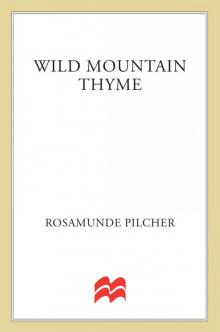 Wild Mountain Thyme
Wild Mountain Thyme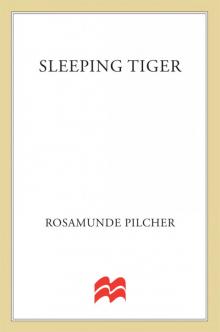 Sleeping Tiger
Sleeping Tiger Flowers in the Rain & Other Stories
Flowers in the Rain & Other Stories September
September The Blue Bedroom: & Other Stories
The Blue Bedroom: & Other Stories The Carousel
The Carousel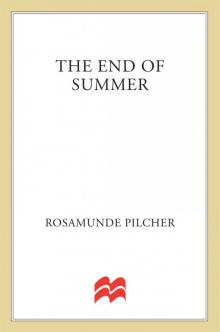 The End of Summer
The End of Summer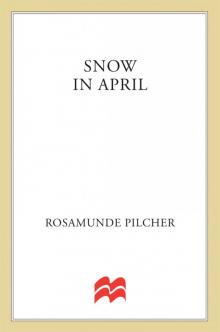 Snow in April
Snow in April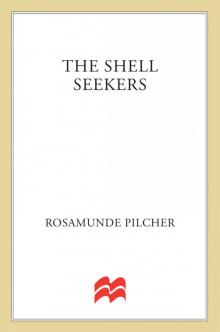 The Shell Seekers
The Shell Seekers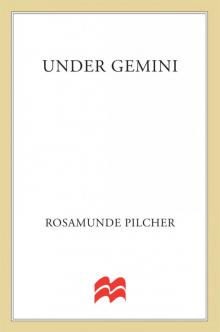 Under Gemini
Under Gemini The Empty House
The Empty House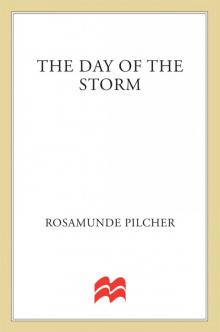 The Day of the Storm
The Day of the Storm Another View
Another View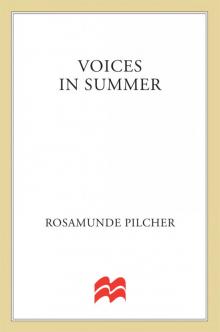 Voices in the Summer
Voices in the Summer The World of Rosamunde Pilcher
The World of Rosamunde Pilcher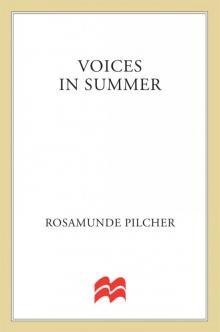 Voices In Summer
Voices In Summer Blue Bedroom and Other Stories
Blue Bedroom and Other Stories